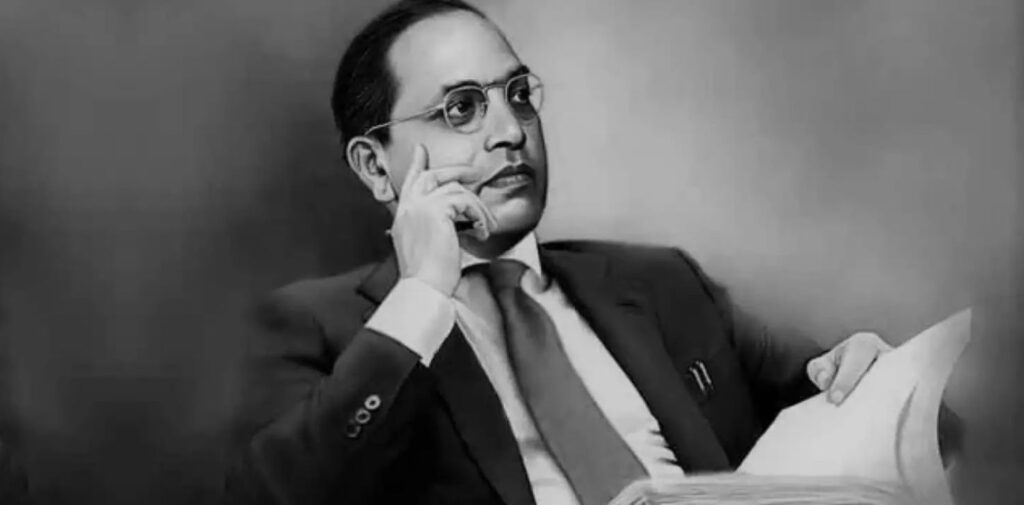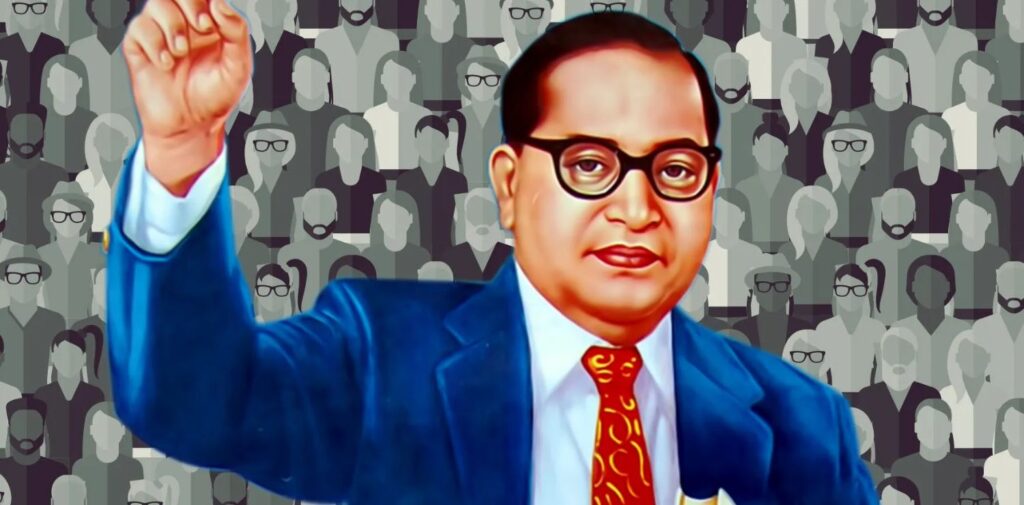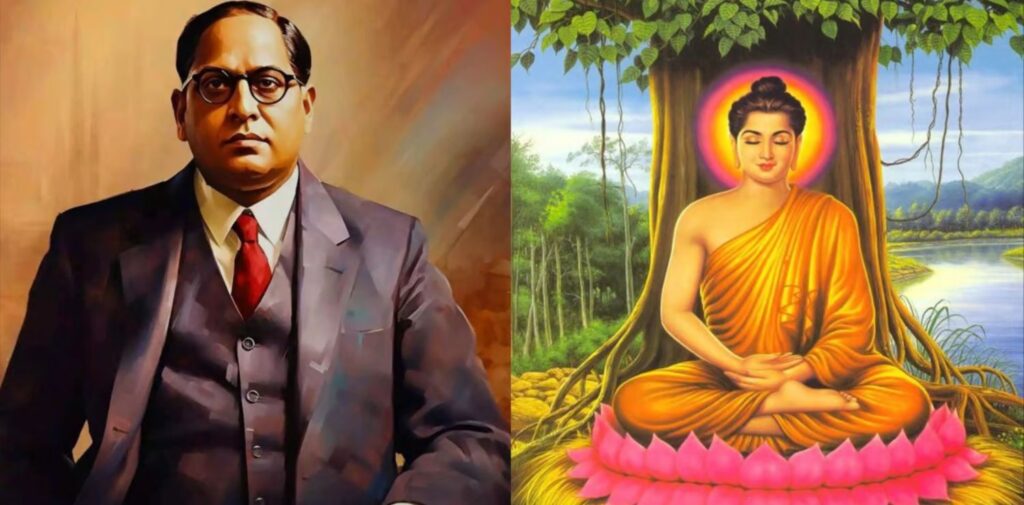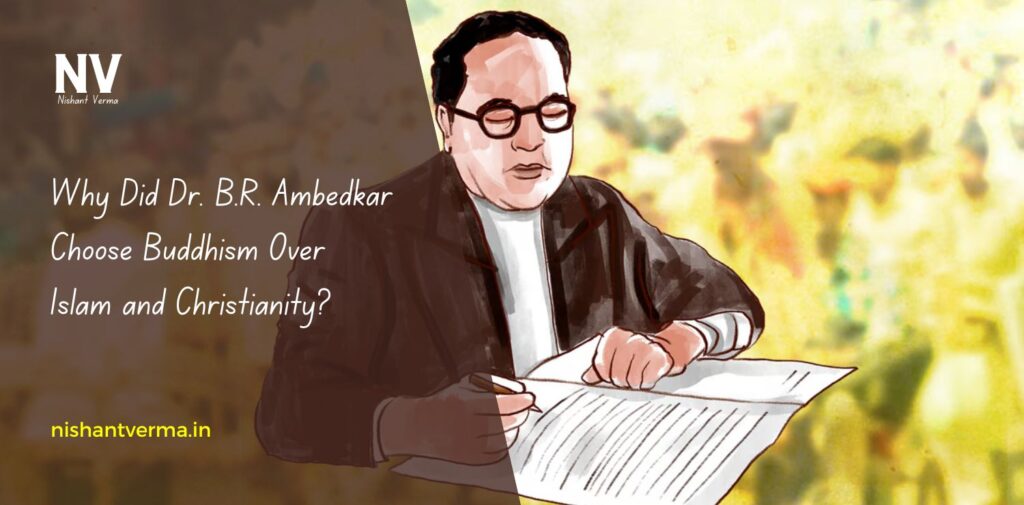Dr. B.R. Ambedkar, one of India’s most influential social reformers, was a man of immense intellect and compassion. Known for his pivotal role in drafting the Indian Constitution and for his relentless fight against the caste system, Ambedkar is remembered as a champion of social justice and equality. One of the most significant decisions of his life was his choice to embrace Buddhism in 1956, which he saw as a way to escape the centuries-old social oppression of the Hindu caste system.
But why did Ambedkar choose Buddhism over other religions, particularly Islam and Christianity, which were also major religions in India at the time? To understand this decision, it is essential to explore Dr. Ambedkar’s views on Hinduism, Islam, Christianity, and Buddhism, and the reasons he found Buddhism to be the most liberating path.
The Caste System and Dr. Ambedkar’s Struggles with Hinduism
Dr. B.R. Ambedkar was born into a Dalit family in 1891, a group that was subjected to the worst forms of discrimination under the rigid caste system of Hindu society. Dalits, once referred to as “Untouchables,” were treated as subhuman and denied basic human rights such as access to education, public resources, and the ability to participate in social and religious activities. From a very young age, Ambedkar faced the harsh realities of this caste-based discrimination. His experiences with exclusion and humiliation in his early life shaped his strong views on Hinduism.
Ambedkar’s primary critique of Hinduism was its support for the caste system, which he saw as an inherent part of the religion. He believed that the caste system was deeply embedded in Hindu religious texts, such as the Manusmriti, and that it perpetuated inequality, discrimination, and social injustice. In his writings, Ambedkar referred to Hinduism as a religion that sanctioned the oppression of Dalits and justified their inferior status. For Ambedkar, the caste system was not just a social institution but a religious sanction for injustice. He believed that reforming Hinduism from within was impossible, as the caste system was central to its religious and social structure.
Ambedkar’s disillusionment with Hinduism grew over time, especially after his efforts to gain equality within the Hindu community were repeatedly thwarted. He tried to reform the religion by advocating for the upliftment of Dalits, but the entrenched caste system and opposition from upper-caste Hindus made it clear that Hinduism, in its traditional form, could never offer true equality to marginalized communities.

The Search for a New Path: Why Not Islam or Christianity?
As Ambedkar rejected Hinduism, he turned his attention to other major religions: Islam and Christianity. Both of these religions had a significant presence in India, and both had been instrumental in spreading the ideas of social justice and equality in the country. Islam, with its emphasis on equality before God and rejection of caste distinctions, seemed appealing to Ambedkar. Christianity, too, with its message of love, compassion, and universal brotherhood, had attracted many Dalits over the centuries.
However, Ambedkar’s views on Islam and Christianity were complex, and he was not convinced that either religion would offer the kind of liberation he sought for Dalits and other marginalized communities. Here are some of the reasons why he ultimately choose Buddhism over these two religions:

Ambedkar’s Critique of Islam
While Islam’s message of equality appealed to Ambedkar, he had reservations about the practical implementation of that message in the Muslim community. Ambedkar recognized that, like Hinduism, Islam also had its own set of social hierarchies. In India, Muslims were divided into different sects and groups, with some experiencing discrimination similar to the caste system in Hinduism. Additionally, Ambedkar believed that the practice of slavery in some parts of the Islamic world contradicted the equality taught by Islam. He was also concerned about the treatment of women in Islamic societies, particularly regarding practices such as polygamy and the veil, which he saw as forms of social control.
Furthermore, Ambedkar believed that converting to Islam would not necessarily end the social oppression of Dalits. He felt that the Muslim community in India was not sufficiently open to accepting Dalits on an equal footing. While Islam’s teachings of equality were appealing, the social realities of Muslim communities in India were far from the ideal of equality that Ambedkar envisioned.
Ambedkar’s Views on Christianity
Ambedkar’s relationship with Christianity was similarly critical. While he admired Christianity’s emphasis on social justice, equality, and love, he did not believe that conversion to Christianity would lead to the complete liberation of Dalits. Ambedkar felt that Christians in India had also internalized caste-based discrimination, particularly in the early years of British colonialism when Christian missionaries often adopted a hierarchical approach to convert Dalits. He believed that Christian conversion often did not lead to true social equality and that Dalits who converted to Christianity were still subjected to discrimination within the church and the broader Christian community.
Ambedkar also felt that Christianity, with its Western roots and colonial history, was foreign to Indian culture. He was concerned that converting to Christianity might lead Dalits to abandon their own cultural heritage and traditions without offering them a genuine path to social justice. Ambedkar wanted a religion that not only promised spiritual equality but also affirmed the cultural identity of Dalits.
Why Buddhism?
After rejecting Hinduism, Islam, and Christianity, Dr. Ambedkar turned to Buddhism, a religion that he found to be uniquely positioned to address the social, cultural, and spiritual needs of oppressed communities in India. There were several reasons why Ambedkar choose Buddhism over other religions:
Buddhism’s Core Teachings of Equality
Buddhism, founded by Siddhartha Gautama (the Buddha) in the 6th century BCE, advocates for equality, compassion, and the rejection of social hierarchies. The Buddha’s teachings emphasize that all people, regardless of their social background or caste, are capable of attaining enlightenment through their own efforts. This message of universal equality was deeply appealing to Ambedkar, who saw it as a direct challenge to the caste system entrenched in Hinduism. Buddhism’s rejection of the caste system and its emphasis on individual merit and moral conduct resonated with Ambedkar’s vision of a just society.

Buddhism’s Non-Authoritarian Nature
Unlike Hinduism, Islam, and Christianity, which Ambedkar believed were heavily influenced by religious authorities and scriptures that often justified social hierarchies, Buddhism offered a more decentralized approach to spiritual practice. Buddhism does not have a rigid clergy or an authoritative religious text like the Bible or the Quran. Instead, it encourages individuals to seek enlightenment through personal meditation, self-reflection, and the cultivation of wisdom and compassion. This flexibility and focus on personal empowerment made Buddhism especially attractive to Ambedkar, who valued autonomy and individual dignity.
Cultural and Spiritual Connection
Buddhism, according to Ambedkar, was a natural part of Indian history and culture. Unlike Christianity and Islam, which had foreign origins, Buddhism was born in India and had a long history in the Indian subcontinent. Ambedkar saw Buddhism as a part of India’s rich cultural heritage, a heritage that had been overshadowed by the dominance of Hinduism and later, the colonization of the British. By embracing Buddhism, Ambedkar believed that Dalits could reconnect with their indigenous spiritual traditions, without the oppressive caste system that had distorted Hinduism.
The Symbol of Resistance
Lastly, Ambedkar saw Buddhism as a symbol of resistance against the oppressive forces that had historically subjugated Dalits and marginalized communities. The Buddha’s rejection of caste and social discrimination, as well as his call for a compassionate society, gave Ambedkar the hope that Buddhism could provide a path for social transformation in India. The act of converting to Buddhism in 1956, along with the thousands of Dalits who followed him, was not just a spiritual decision—it was a powerful act of social defiance and a declaration of resistance against the injustices of the caste system.
Conclusion: Dr. B.R. Ambedkar
Dr. B.R. Ambedkar’s decision to embrace Buddhism was not just a personal spiritual choice, but a revolutionary act aimed at social reform and the liberation of the oppressed. Buddhism offered Ambedkar a path that was rooted in equality, compassion, and a rejection of social hierarchies—values that he believed were essential for building a just society. While Islam and Christianity had their own merits, Ambedkar saw in Buddhism a faith that was both culturally resonant and spiritually liberating for the Dalits of India. His embrace of Buddhism was a pivotal moment in Indian history, symbolizing a break from centuries of social oppression and the beginning of a new era of social justice for the marginalized.




